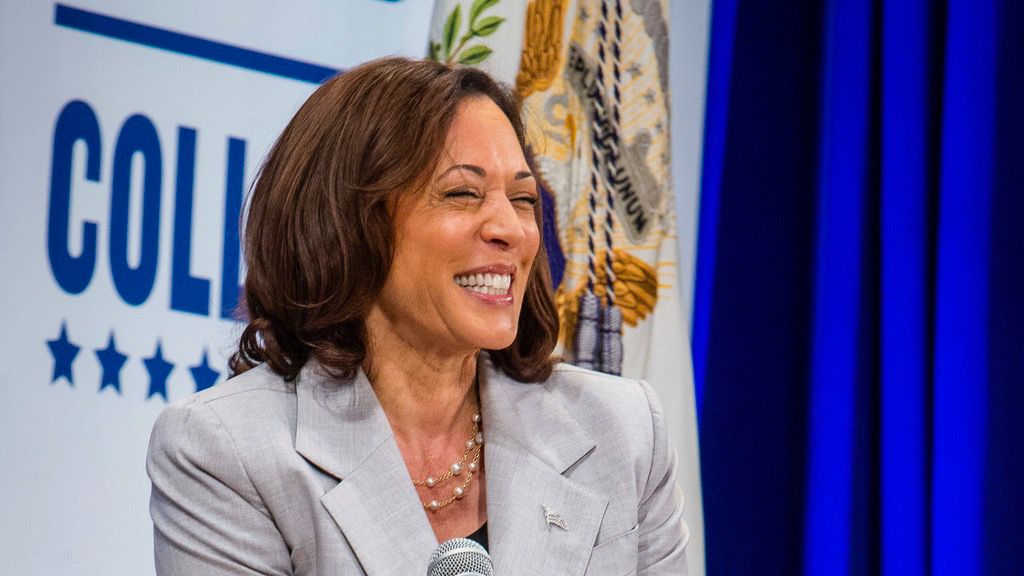There are few crowds that Vice President Kamala Harris seems more at ease in front of than crowds of HBCU students, like the crowd assembled at North Carolina A&T University, in Greensboro, N.C., on Friday.
Holding a microphone in front of hundreds of young, educated Black men and women is her wheelhouse, allowing Harris to talk policy, platforms and hope with people she considers to be leaders in their communities, and future leaders of America.
“And as you continue in your role of leadership, you are going to make a fundamental and profound difference for the betterment of our entire country and the world,” Harris said, on the second stop of her “Fighting for our Freedoms” tour of universities.
The students seem to love Harris, a Howard University alumna, back — though it didn’t hurt that she was chatting in a moderated conversation with a pair of A&T alums, Environmental Protection Agency Administrator Michael Regan and actor Terrence J.
Harris’ tour of the colleges functions as a rally for the administration and to energize students.
“During the event, the Vice President will focus on key issues that disproportionately impact young people across America – from reproductive freedom and gun safety to climate action, voting rights, LGBTQ+ equality, mental health, and book bans,” a White House official said ahead of the event, adding that Harris would also highlight how the Biden-Harris administration has “delivered for young people” and “outline the work ahead to protect fundamental freedoms.”
That work could boil down very simply, according to her response to Regan’s question about conservative attempts to change the Black history curriculum in Florida schools.
“We elect them out of office. Let’s start with that,” Harris said. “It’s extremist so-called leaders pushing this agenda; we cannot sit passively by while this happens…when we talk about these attempts to erase our history, let’s be alert, conscious and active about making sure these folks don’t get away with what they’re trying to do.”
The conversation varied from gun laws — where Harris reiterated her interest in an assault weapons ban (“assault weapons were literally designed to kill a lot of human beings quickly,” she emphasized) before stressing that pro-legislation Congress can’t properly act without a numbers advantage driven by voters — to voter registration laws.
“We are seeing laws being passed that would say that student IDs are not sufficient to prove your identity to vote, because when you vote, it scares some folks. But when you vote, you have the ability to determine the future of our country in a way that might challenge a lot of people’s notions about what is possible, and who can possibly do it,” Harris said. “I think it’s really powerful when we understand when people are trying to suppress our vote and make us feel small…don’t fall for it. Because when you all vote in your numbers, so much is going to change about our world.”
When the conversation turned toward environmental justice, Harris said that government must put “extra resources into poor communities” which are prone to having bad air, bad water, feel the effects of hurricanes or floods, or all three. Regan added, in response to a student question, that the federal government is investigating potential Title VI violations — instances in which federal funding is being used by state or local administrators in a way that discriminates against a group — to withhold government funding.
Not every case has been a victory. The EPA also closed multiple Title VI civil rights cases of two Louisiana state agencies suspected of discriminating against Black communities over the summer. Those investigations closed not long after Louisiana Attorney General Jeff Landry — a Republican candidate for governor in 2024 — sued the agency, arguing that it was overstepping its authority, and accusing officials of “moonlight[ing] as social justice warriors fixated on race.” However, the government has obtained multiple Title VI settlements earlier this year, in two Texas cases — one addressing interstate expansion impacts, and another regarding illegal dumping in Black and Latino neighborhoods — and in Alabama over failing sewer systems.
Harris’ college tour continues on Sept. 26, with a visit to Morehouse College in Atlanta, followed by planned trips to universities in Wisconsin, Nevada and Arizona.



